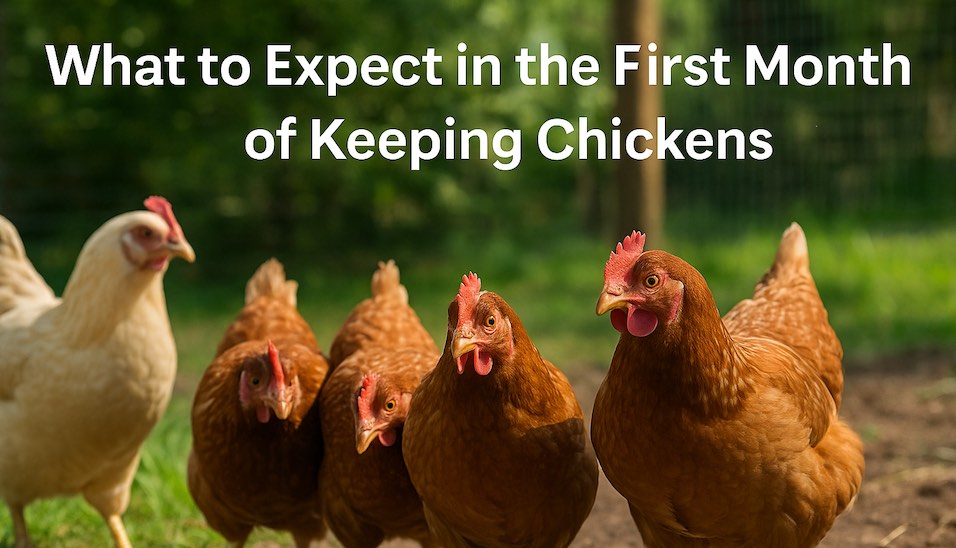Backyard chickens with diarrhoea - what to do
Help! My chickens have diarrhoea.
Do your chickens have diarrhoea? With chickens, diarrhoea is a common indicator of health issues. While the odd “strange poo” is nothing to be concerned about, consistent diarrhoea needs investigation and treatment.
Recognising diarrhoea in backyard chickens
The first question to ask is 'Do my chickens have diarrhoea?'
Many new chicken keepers mistake completely normal chicken poo for diarrhoea. That is because the odd runny poo, poo-y egg or dirty butt is normal. But if runny poo occurs all the time, then you have a problem.
Diarrhoea in chickens is:
- Constantly liquid poos
- Very watery or runny poos
- Poo containing blood, pus, worms etc.
- A constantly dirty butt where the feathers are caked in droppings
Caecal poos, however, are not diarrhoea and are completely normal. Caecal poos are pasty droppings and are usually black or brown in colour. They are sticky, smelly and more homogenous than "normal" chicken poo. Caecal poos should make up about 1/3 of droppings.
Where diarrhoea is an issue, other symptoms of illness may also appear. For example:
- Lethargy
- Poor appetite
- Weight loss
- Ruffled or puffed up feathers
What causes diarrhoea in backyard chickens?
Diarrhoea can be problematic because it is is a symptom of many different chicken illnesses. And if, for example, the diarrhoea is a symptom of coccidiosis, then immediate treatment is essential.
In our experience, heat stress, coccidiosis and worms are the most common causes of diarrhoea in backyard chickens. But if you are unsure then seeking veterinary advice is the best way of diagnosing the cause of diarrhoea.
Be on the look-out for other symptoms of some of the most common causes of diarrhoea in chickens, such as:
- Heat stress: Panting and listlessness during hot weather (above 29 degrees Celsius)
- Vent prolapse: Redness or protruding flesh around the vent
- Coccidiosis: Severe bloody, watery diarrhoea and lethargy
- Heavy worm infestation requiring treatment: Worms visible in droppings
- Excess salt
- Marek’s disease
- E. coli infection
- Avian leukosis
- Avian intestinal spirochetosis
- Avian tuberculosis
- Fowl cholera
- Infectious coryza
In young chicks, coccidiosis is by far the most likely cause of diarrhoea. In chicks, immediate treatment for coccidiosis is recommended, even if you are not sure of the diagnosis, as they can quickly succumb to the disease.
Preventing and treating diarrhoea in chickens
The only way to prevent diarrhoea is to prevent the problem that is causing it. However, maintaining a clean coop and practicing good biosecurity help prevent problems from occurring. Using probiotics and ACV in drinking water has also been linked to improved immune-response to common diarrhoea-causing parasites and diseases. In hot weather, avian electrolytes can also help prevent diarrhoea caused by heat stress.
Like prevention, treatment for diarrhoea depends on the cause. And unless other clear symptoms present, it is difficult to identify the illness without veterinary testing.
However, it is important that you:
- Ensure all birds have ample access to clean water
- Isolate any affected birds, preferably individually
- Clean the coop thoroughly
- Identify the cause of diarrhoea and treat the illness
- Dose birds with probiotics and ACV. This will potentially help sick birds fight off the illness and prevent its spread within the flock.
It is not recommended that antibiotics or other medications are used without conclusively diagnosing the illness and/or seeking veterinary advice. It is difficult to choose the right drug without knowing what it is fighting, and generalised antibiotic use contributes to the development of antibiotic-resistance.
Visit our Chicken Health page for more information on the symptoms of common chicken diseases.
Rachael at Dine a Chook Australia




